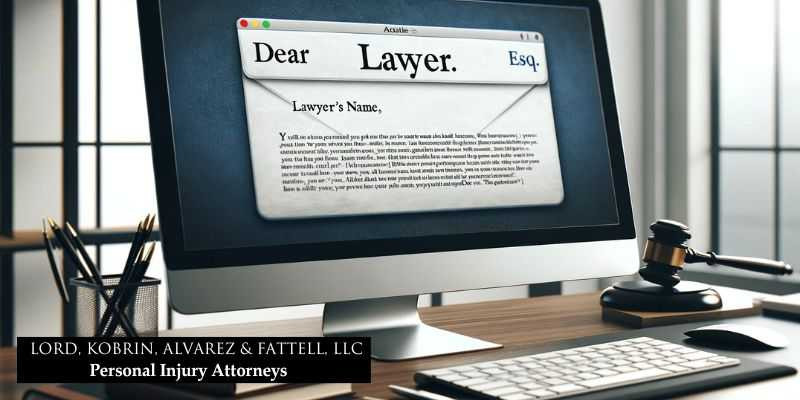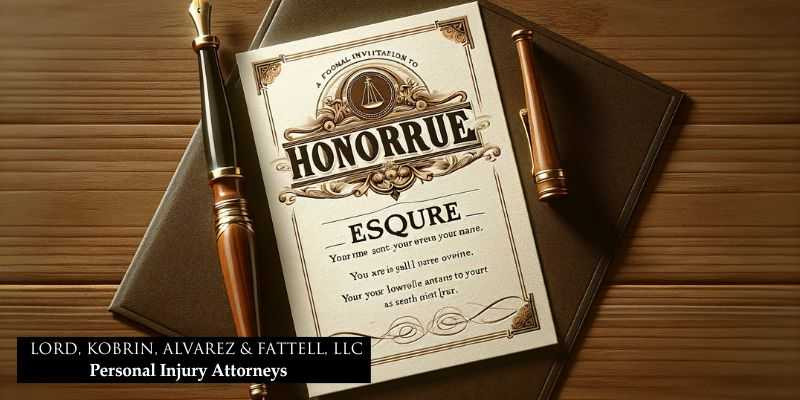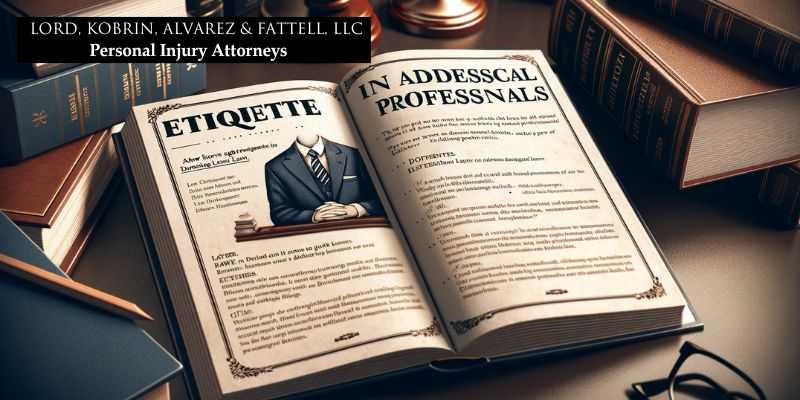Knowing How To Address A Lawyer correctly is crucial for establishing respectful and effective communication, whether you are interacting in person, writing a letter, or engaging in formal legal proceedings. This guide provides essential insights into the proper etiquette for addressing lawyers, ensuring your interactions are professional and courteous.
Understanding Professional Titles: Formal Ways to Address Lawyers
Professional titles in the legal field carry significant weight and formality. Using the correct form of address shows respect for their qualifications and the legal system. Addressing a lawyer, also known formally as an “attorney at law,” requires adherence to specific etiquette, particularly in formal communications and legal settings.
A widely accepted and respectful way to address an attorney is by using the courtesy title “Esquire,” often abbreviated as “Esq.,” as a post-nominal suffix. When writing to a lawyer, it is customary to use their full name followed by “Esq.” For example, you would write “Jane Doe, Esq.” if addressing a female attorney named Jane Doe.
While “Esq.” is traditionally associated with male attorneys, it is now commonly used for both male and female lawyers. However, some female attorneys might prefer “Ms.” or “Mx.” in social contexts or when a more gender-neutral approach is desired. In professional legal contexts, “Esq.” remains a standard and respectful title for all attorneys.
Remember, the title “Esq.” is primarily used in professional settings and always follows the attorney’s full name. Mastering this form of address demonstrates your understanding of legal decorum and respect for the attorney’s profession.
 Email to lawyer using Esq.
Email to lawyer using Esq.
When to Use ‘Esquire’: Formal vs. Informal Settings
The use of “Esquire” largely depends on the context of your communication. In formal legal settings and written correspondence related to legal matters, “Esquire” is generally the most appropriate title. This includes legal letters, court documents, and formal invitations related to professional legal events.
“Esquire” signifies the attorney’s professional achievement of passing the bar exam and their status as a member of the legal profession. It is akin to using professional titles like “M.D.” for a doctor or “Ph.D.” for a doctorate holder in academic settings.
However, in social or informal settings, such as a casual conversation or social correspondence, using “Esquire” might sound overly formal. In these situations, it is perfectly acceptable to address an attorney using courtesy titles like “Mr.,” “Ms.,” or “Mx.” followed by their last name, or even by their first name if you have a more personal relationship.
It’s always a good practice to consider your relationship with the attorney and the context of the interaction when deciding whether to use “Esquire.” If you are unsure, opting for a slightly more formal approach with “Esquire” is generally safer, as it conveys respect without being presumptuous.
 Formal invitation addressed to lawyer.
Formal invitation addressed to lawyer.
Salutations in Written Communication: Mastering ‘Mr.,’ ‘Ms.,’ and ‘Esq.’
Salutations are the opening greetings in written correspondence and set the tone for your message. In communications with lawyers, choosing the right salutation is essential for maintaining a professional and respectful tone.
The standard salutations used are “Mr.,” “Ms.,” and “Esq.” “Esq.” is specifically reserved for attorneys and is the conventional way to address them in legal matters. For a newly established professional relationship, a formal salutation like “Dear Mr./Ms./Mx. [Last Name]” followed by a comma is appropriate. Alternatively, “Dear [Full Name], Esq.” is also a correct and formal salutation.
When addressing a female attorney, be mindful of personal preferences. While “Ms.” is a common courtesy title, in legal contexts, “Esq.” is equally appropriate and professionally recognized for female attorneys. In formal legal correspondence, using “Esq.” after their full name is generally preferred.
In situations where you are addressing a lawyer and their spouse in correspondence, the correct format is to list the attorney first using their professional title, followed by their spouse. For example, “Ms. [Attorney’s Last Name], Esq. and Mr./Ms./Mx. [Spouse’s Last Name].” This format respects both individuals and their professional identities.
Navigating Professional and Social Settings: Formal vs. Casual Address
The setting of your interaction significantly influences how you should address a lawyer. Understanding the difference between professional and social settings is key to choosing the appropriate form of address.
In professional settings, such as courtrooms, law offices, business meetings, or formal legal correspondence, it is essential to use formal titles. This includes using “Esquire” in written addresses and “Mr./Ms./Mx. [Last Name]” or “Your Honor” (in court) when speaking directly. Using full formal titles in these settings demonstrates respect for the lawyer’s professional role and the seriousness of the legal context.
In social settings, a more relaxed approach is acceptable. If you know the lawyer well, using their first name is often appropriate. If you are in a less formal but still professional social setting, such as a networking event or a social gathering of legal professionals, using “Mr./Ms./Mx. [Last Name]” is a courteous and respectful option.
If you are ever unsure about the preferred form of address, it is always best to err on the side of formality or simply ask the attorney directly. A quick and polite inquiry like, “How would you prefer to be addressed?” is perfectly acceptable and shows consideration for their preference.
 Law book on desk.
Law book on desk.
Addressing Female Attorneys: Names, Titles, and Respect
It is crucial to address female attorneys with the same level of respect and formality as their male counterparts. In the legal profession, gender should not influence the form of address used. The principle of professional etiquette applies equally to all lawyers, regardless of gender.
A common misconception is that female attorneys should be addressed differently. However, the correct approach is to use their first and last name in professional communication, just as you would for any attorney. Using titles like “Esq.” is equally appropriate and respectful for female attorneys in all professional legal contexts.
Some female attorneys may choose to use their maiden name professionally, even if they use their married name socially. It is important to respect this choice in professional correspondence and legal matters. When in doubt, it’s always best to use the name they use professionally, which can often be found on their business cards or law firm website.
Remember, the key is to maintain professional decorum and show respect for their professional achievements, irrespective of gender. Using “Esq.” or “Attorney at Law” is a sign of recognition and respect for their qualifications and role in the legal field.
‘Attorney at Law’ and Other Formal Designations
The designation “Attorney at Law” is a formal way to recognize an individual who is licensed to practice law. This title signifies their completion of rigorous legal education, passing the bar exam, and being admitted to the bar. It is a testament to their legal expertise and professional standing.
While “Attorney at Law” is a formal and correct way to refer to a lawyer, it is less commonly used in direct address compared to “Esquire.” “Attorney at Law” is often used in formal descriptions or when emphasizing someone’s legal profession in general statements.
In direct address, using “Esquire” or “Mr./Ms./Mx. [Last Name]” is more common and practical. However, understanding the significance of “Attorney at Law” helps appreciate the weight of the legal profession and the qualifications of those who hold this title.
When addressing a lawyer directly, especially in written correspondence, it is generally preferable to use “Esquire” or “Mr./Ms./Mx. [Last Name]” as these are more conventional and directly applicable forms of address in most situations. “Attorney at Law” is more often used in descriptive contexts rather than as a direct salutation.
 Lawyer networking event.
Lawyer networking event.
Academic Credentials: JD and How it Affects Addressing
The Juris Doctor (JD) is the primary law degree in many countries, including the United States. It signifies that an individual has completed law school and is qualified to pursue a legal career. While it is a significant academic achievement, the JD is not typically used as a title in direct address in the same way as “Dr.” (for a medical doctor or Ph.D. holder).
Unlike medical doctors or Ph.D. holders who often use their titles socially, lawyers with a JD generally do not use “JD” as a social title. In professional legal settings, the focus is more on the title “Esquire” which denotes their professional status as a practicing attorney, rather than their academic degree.
Therefore, while it is important to recognize the JD as a significant academic credential, it does not typically influence how you would directly address a lawyer. The forms of address remain “Esquire,” “Mr./Ms./Mx. [Last Name],” or their first name in informal settings. The emphasis remains on professional courtesy and respect, primarily conveyed through the use of “Esquire” in formal legal contexts.
 Handshake in law office.
Handshake in law office.
Read Next:
Contact Lord, Kobrin, Alvarez, and Fattell for a FREE consultation. Our dedicated team is ready to fight for your rights. 908-232-7666 TAP TO CALL
